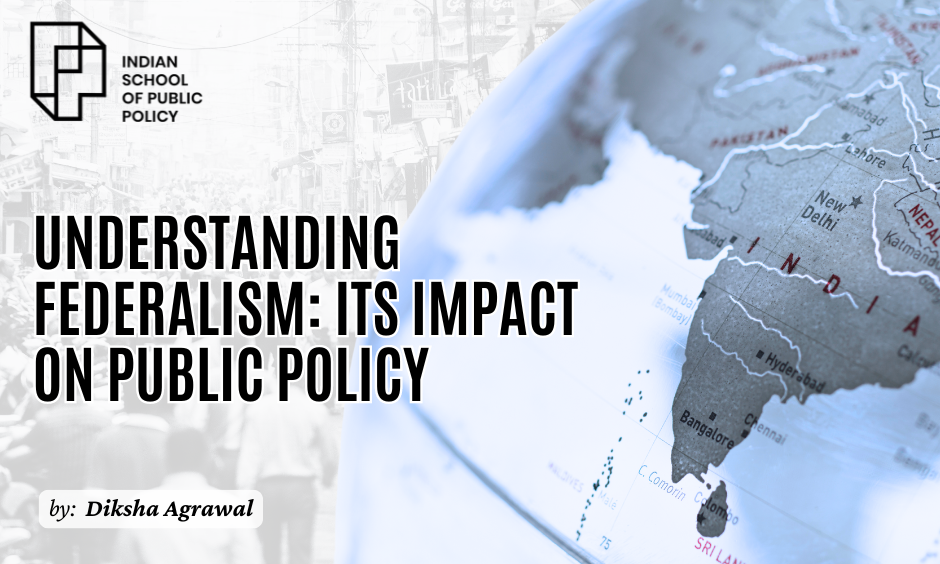
Understanding Federalism: Its Impact on Public Policy

More than 30 years ago, Martin Diamond posed a significant question in one of his essays: What do we want from federalism? His answer was perhaps hopelessly optimistic. He viewed federalism as a system that helps preserve individual liberties, creates a sense of citizenship, and provides a flexible response to diverse problems of society. His perspective is a good starting point for us to understand the role of federalism in shaping and executing public policies worldwide. However, the understanding of the impact of federalism on public policy is contested and debated by contemporary academicians and researchers. This blog will aim to comprehensively analyse the benefits and challenges associated with federalism in democratic societies, focussing specifically on its impact on public policy.
To define it simply, federalism is a model of governance that divides power between national and regional governments, offering both benefits and challenges in policymaking. Let’s now delve into the various advantages and challenges of federalism in policymaking:
BENEFITS OF FEDERALISM IN POLICYMAKING
- Federalism facilitates integrating diverse ethnic, cultural, and regional groups within society. It helps integrate their distinct needs and preferences into the policymaking process. Each level of government can address local issues more effectively, leading to a better understanding of communities’ unique needs. Rolland Sturm, in his work Federalism as a model for successful policymaking and as a challenge to governance, calls this integration of centrifugal forces as it seeks to harmonise various regional demands.
- Federalism allows for multilevel policy-making, facilitating communication between different levels of government and eventually leading to more informed decision-making.
- According to Pietro Nivola in Why Federalism Matters, federalism allows various regions to experiment with policies independently, creating multiple innovation centres. He calls this “laboratory federalism” as successful policies that can serve as models for others, leading to a more vibrant and dynamic environment for policy development. An excellent example of laboratory federalism in India would be how the Goods and Services Tax was rolled out in India. States like Gujarat and Maharashtra initially piloted various aspects of GST before being rolled out nationally. These states identified the potential challenges and solutions associated with GST implementation before broader adoption, making the process more effective and efficient. Another related concept introduced by Nivola is decentralised innovation, where the regions have the liberty to implement and test policies that suit their specific needs leading to diverse solutions and more effective outcomes.
- Including various stakeholders and regional actors in the entire policy lifecycle, formulation enhances the legitimacy of decisions and creates a sense of shared responsibility. When policies respect regional traditions and identities and accept the associated challenges, they gain acceptance and support from the local population. For example, Pradhan Mantri Gram Sadak Yojana, a rural road development scheme, acknowledges that mountainous terrain in Himachal Pradesh requires special attention. It has been adapted to include local knowledge in road construction practices, such as using local materials and methods suited to the region’s geography. The example also suggests that federalism allows policies to be adapted to fit regional contexts, allowing local issues to be addressed more effectively than a “one size fits all approach”.
- As Pietro Nivolo suggests, governance theory is shifting worldwide. Modern governance theory follows network governance, where interconnected actors replace traditional hierarchical decision-making structures.
CHALLENGES ASSOCIATED WITH FEDERALISM IN POLICYMAKING
- Federalism requires coordination among multiple layers of government, which can lead to bureaucratic inefficiencies and difficulties in implementing policy. For example, inefficient coordination between states and centres became challenging during the COVID-19 crisis in India, which sometimes led to mixed messaging. For example, states had the autonomy to develop their lockdown and travel norms, often contrary to central government guidelines. This frequently led to confusion among the public regarding travel norms and containment measures. The central government played a vital role in procuring and distributing essential supplies of PPE kits and vaccines. However, the allocation of these resources became contentious when states like UP and Bihar faced delays in receiving adequate supplies, affecting their response efforts.
- There is potential for conflict in federations with low trust or high instability. Policymaking in such countries can become challenging if regional and federal interests differ. For example, in Nigeria, the insurgency of the militant group Boko Haram in Nigeria’s northeastern states has strained federal-state relations. The federal government’s use of strategies like military interventions has conflicted with regional leaders’ preferences, creating tensions between the two units.
- According to Sturm, in Federalism as a model for successful policymaking and as a challenge to governance, in federations, policies often converge around a middle ground because of the need for broad political consensus, leading to compromise-driven policymaking.
- Some highly centralised federations allow for interconnected policymaking where regional and national policies closely align, often leading to overshadowing regional interests. For example, the United Arab Emirates is a federation of seven emirates, but the federal government controls critical areas like foreign policy, defence, and major economic sectors. Significant economic and infrastructure projects related to oil and gas and large-scale urban development are controlled and directed by the federal government. This has led to the overshadowing of the individual emirates’ economic priorities and unique needs.
While federalism has its set of challenges, there is no denying the fact that most democratic countries prefer to have a federal model of governance so that regional interests and voices at all levels of governance are included in the process of policymaking. While including their voices is necessary, an even more critical step is to provide them the financial autonomy to make their own decisions. Without sufficient financial resources, regional governments may only engage in symbolic politics rather than enacting substantive reforms. By granting regions greater financial autonomy, federal systems can empower local governments to enact and manage policies that are more responsive to their unique needs. This approach could reduce inconsistencies and conflicts while promoting innovation and ensuring policies are effective and legitimate.
Register your Interest to Study at ISPP
References
- Sturm, R. (n.d.). FEDERALISM AS a MODEL FOR SUCCESSFUL POLICY-MAKING AND AS a CHALLENGE TO GOVERNANCE. https://www.hss.de/download/publications/Federalism_2016_02.pdf
- Wiltshire, K. (2020). Federalism and Policy Implementation. Oxford Research Encyclopedias. https://oxfordre.com/politics/display/10.1093/acrefore/9780190228637.001.0001/acrefore-9780190228637-e-1408
- Nivola, P. S. (2005, October 1). Why federalism matters. Brookings. https://www.brookings.edu/articles/why-federalism-matters/

Diksha Agrawal
Programme Advisor – Admissions
Diksha Agrawal, a Sociology graduate from Miranda House and postgraduate from Delhi School of Economics, embarked on her professional journey as a research fellow for Prashant Kishore’s Jan Suraaj initiative. Travelling across various districts of Bihar, she gained profound insights into the diverse needs of communities, igniting a deep interest in the field of public policy.
Furthering her engagement in politics and governance, Diksha served as a consultant for Inclusive Minds, political consultancy working for Indian National Congress during the Chhattisgarh elections. This role provided her with invaluable insights into the socio-political landscape of the state, reinforcing her determination to drive positive change through effective policy formulation and implementation.


